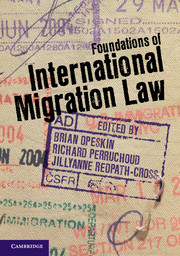Book contents
- Frontmatter
- Summary contents
- Detailed contents
- Preface
- List of case studies
- List of boxes
- List of figures
- List of maps
- List of tables
- Notes on contributors
- Abbreviations
- 1 Conceptualising international migration law
- 2 Contemporary patterns of international migration
- 3 Sources of international migration law
- 4 Nationality and statelessness
- 5 State sovereignty and freedom of movement
- 6 International human rights of migrants
- 7 Refugees and asylum
- 8 Women, children and other marginalised migrant groups
- 9 Human trafficking and smuggling
- 10 International migration by sea and air
- 11 International labour migration
- 12 International trade law and labour mobility
- 13 Global migration institutions and processes
- 14 Regional processes, law and institutional developments on migration
- 15 Emerging legal issues in international migration
- Appendix 1 Cases
- Appendix 2 Treaties and other international instruments
- Glossary
- Index
- References
15 - Emerging legal issues in international migration
Published online by Cambridge University Press: 05 November 2012
- Frontmatter
- Summary contents
- Detailed contents
- Preface
- List of case studies
- List of boxes
- List of figures
- List of maps
- List of tables
- Notes on contributors
- Abbreviations
- 1 Conceptualising international migration law
- 2 Contemporary patterns of international migration
- 3 Sources of international migration law
- 4 Nationality and statelessness
- 5 State sovereignty and freedom of movement
- 6 International human rights of migrants
- 7 Refugees and asylum
- 8 Women, children and other marginalised migrant groups
- 9 Human trafficking and smuggling
- 10 International migration by sea and air
- 11 International labour migration
- 12 International trade law and labour mobility
- 13 Global migration institutions and processes
- 14 Regional processes, law and institutional developments on migration
- 15 Emerging legal issues in international migration
- Appendix 1 Cases
- Appendix 2 Treaties and other international instruments
- Glossary
- Index
- References
Summary
INTRODUCTION
It is clear that there is no comprehensive universal legal framework governing the mobility of human beings. Nonetheless, it is generally agreed that there are numerous, albeit somewhat scattered, elements of a legal and normative framework, derived from binding global and regional instruments and accompanied by informal and non-binding understandings among States.
The exact nature and status of this assemblage is subject to debate, but the research literature leaves readers in no doubt that they are in the presence of work in progress. The body of dispersed, disparate, rather unevenly joined items has been characterised variously as an emergent regime or ‘substance without architecture’. Lillich’s early observation that the topic of the rights of aliens in international law was like a ‘giant unassembled jigsaw’ may appropriately be applied today to the more comprehensive framework now thought needed, or at least desirable, to ensure effective governance of human mobility in all of its manifestations. Construction sites abound. Some have a bilateral regulatory focus, as in the case of the management of labour migration flows; some have a rights-based orientation and dwell on the definition and protection of those rights; still others address mobility from the point of view of the necessity to balance facilitation of movement with entry control. Some boast robust and finished structures, such as the International Convention on the Protection of the Rights of All Migrant Workers and Members of their Families (1990); others are best conceptualised simply as passageways to major adjoining policy areas, such as trade.
- Type
- Chapter
- Information
- Foundations of International Migration Law , pp. 390 - 418Publisher: Cambridge University PressPrint publication year: 2012
References
- 1
- Cited by



